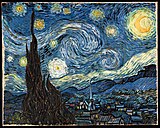 |
| The Starry Night |
One of the first novels I tried to write (emphasis on tried) was about Vincent Van Gogh. I'm not sure when I first heard of the famous painter, but I've been interested in him and his life for as long as I can remember. I can remember being in the 5th grade (Mrs. Newton's 4th/5th split class--anyone else remember those?) and doing a project based around famous artists. Even then, I had some idea who Van Gogh was, but I learned a few more details about his life, which only enhanced my curiosity.
I would still like to write that book about his life. Why didn't I, you ask? Two reasons:
1) The research. When I first began the manuscript, I had almost no research under my belt and almost no way to get at it. Sure, I read many books on Van Gogh's life and his extensive correspondence which was carefully preserved by his sister-in-law, Jo. But it wasn't enough. I'd sit down to write about Theo sitting at a desk--or was it a bureau? And after Vincent hurt himself, a police man got involved. But this was France in the late 1800s, so actually it would have been a Constable. I just didn't feel like I had enough cultural details.
2) It's sad. Is this an awesome excuse? No, not in the slightest. Is it a viable one? I think so. At least, it is for me. Van Gogh's life was tremendously sad and as a writer it's my job to bring the emotions out, especially those that charge a character's motivations. In order to understand why Van Gogh was the way he was, and why he made the choices he did, you have to understand all the tragedies of his life. It's not easy to read, and it's definitely not easy to write.
I would write a few chapters, then have to go home and hug my brothers. I'm an emotional person so this book, unfortunately, may take me years to finish!
So I repeat: What do you know about Vincent Van Gogh? (I don't just keep typing that because it rhymes. I promise! :D)
Most people know exactly three things about Vincent Van Gogh: 1) He painted The Starry Night. 2) He cut off his own ear. 3) He had some psychological problems and committed suicide. I list those last two together because they more or less go hand in hand.
What most people don't know is that Van Gogh was not the oldest child in his family. He was the oldest living child in his family. (So what, you say? Well listen to this next part!) Would it weird you out to learn that Van Gogh had an older brother, born exactly one year before him (on the same day) and also named Vincent?
How would that happen? Van Gogh's parents wanted to name their oldest son Vincent. The reason for this was that Van Gogh's father's favorite brother (whom Vincent would have called Uncle Cent) had no children. His inheritance (which was substantial) would go to his brother's son. Because of this, and because the two brothers were close, Father Van Gogh wanted to name his oldest son after his brother. When the first baby died in the cradle, they named the second one (who would become the famous painter we all speculate about) likewise.
Sounds pretty logical, right? Unfortunately, this wreaked havoc on Vincent's sense of identity. His mother developed a form of depression commonly known as Replacement Child Syndrome. This happens when a woman loses a baby, and is never able to move on with her life. She elevates the memory of that dearly departed child onto such a high pedastal as to be unrealistic. When her other children do things that all normal babies do--mess their diapers, cry, begin to crawl and get into things--she holds them up to that ideal and unrealistic view of how perfect her first, deceased child would ahve been, and says things like, 'why can't you be more perfect like your brother would have been.'
This was the atmosphere our dear artist grew up in. Of course, as an innocent child, he could never understand why. And then there was that tiny grave in the church yard that his mother visited every week, left flowers on, and wept over that had his name and birth date on it.
This tragic set of circumstances into which Van Gogh was born left his drowning in an identity crisis that in all his thirty-seven years he never found his way out of.
I'm not sure what is more disturbing: that this 'syndrome' exists at all or that it's common enough that we have a name for it. What do you think?
Liesel I imagine it would be hard to write about his life. Just a tragic soul. It makes me sad just thinking about it. I'd never heard of that syndrome. How sad.
ReplyDeleteYes, very tragic, and very hard to write about. I'm not sure how much of an audience I'd actually have for such a book because it would be just. so. freakin'. sad! But who knows? I may go back to it some day. Thanks for the input, Maurice! :D
Delete